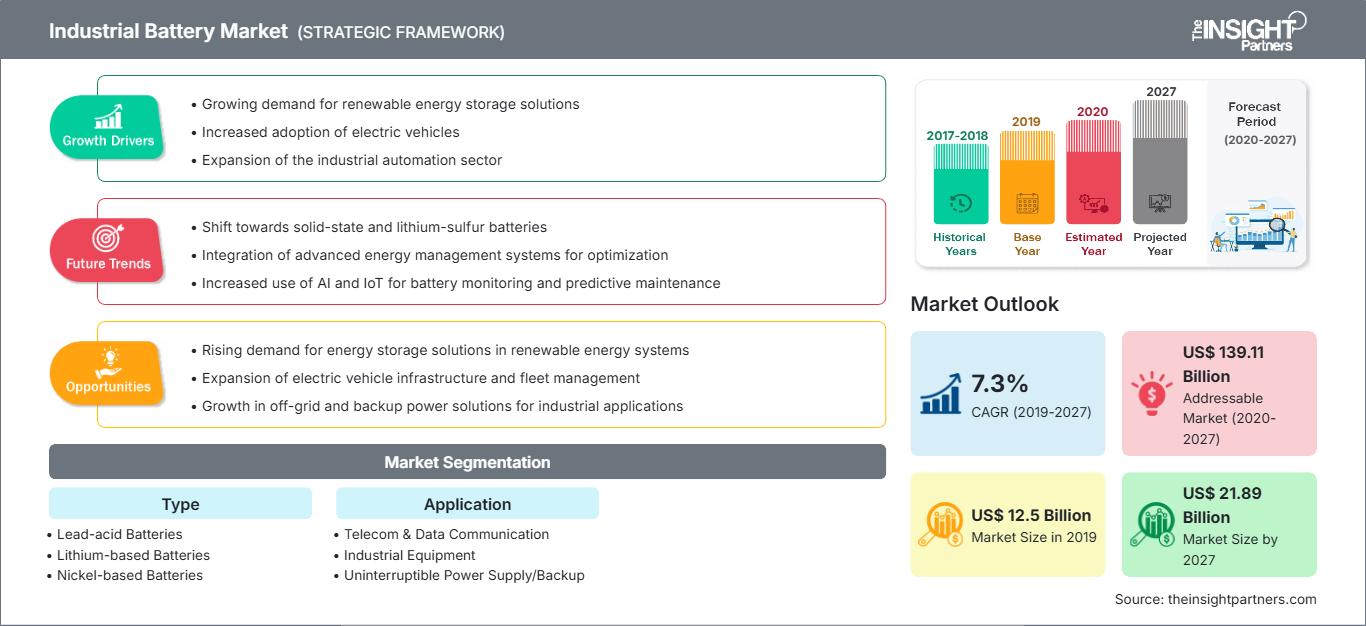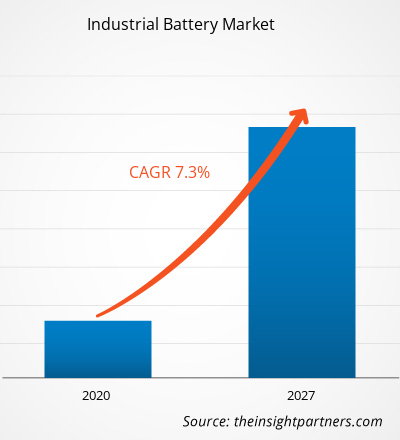산업용 배터리 시장은 2019년 12,501.9백만 달러 규모였으며, 2020년부터 2027년까지 연평균 성장률 7.3%로 성장하여 2027년에는 21,893.5백만 달러에 이를 것으로 예상됩니다.
산업용 배터리는 극한의 온도, 진동 증가, 잦은 사용 등 혹독한 산업 환경에서도 작동할 수 있도록 특수 설계된 배터리입니다. 산업용 배터리는 배터리 성능을 향상시키고 더욱 강력하게 설계되었습니다. 현재 시장 상황에서 기업들은 다양한 산업용 배터리 요구를 충족하는 고효율 배터리 개발을 위해 적극적으로 노력하고 있습니다. 예측 기간 동안 글로벌 산업용 배터리 시장은 괄목할 만한 성장을 보일 것으로 예상됩니다. 리튬 기반 배터리에 대한 수요는 예측 기간 동안 크게 증가할 것으로 예상됩니다. 리튬 배터리는 낮은 배출, 수명 주기 증가, 재활용 가능성과 같은 장점으로 인해 다양한 산업 분야에서 채택이 증가할 것으로 예상됩니다. 시장에서 활동하는 기업들은 탄탄한 고객 기반을 확보하고 상당한 시장 점유율을 확보하기 위해 신제품 개발에 집중하고 있습니다.
미국을 비롯한 북미 국가 정부는 제조업 생산성 향상을 위해 지속적인 노력을 기울이고 있습니다. 제조 공정 간소화를 위한 최신 기술 도입 및 창고 수 증가 등이 그 예입니다. 이러한 창고 자동화 기술은 북미 산업용 배터리 시장 성장에 긍정적인 영향을 미칠 것으로 예상됩니다. 정부의 지출 증가는 모든 기술 개발을 촉진합니다. 북미 지역에서는 기술 발전 활동에 대한 정부 지출이 매우 높아 모든 사업이 성장하기에 유리한 환경을 조성합니다. IoT, 빅데이터, 그리고 첨단 기술 도입이 이 지역에서 활발하게 이루어지고 있습니다. 이러한 기술들은 향상된 네트워크에 대한 요구와 산업용 배터리 수요를 촉진합니다. 산업용 배터리 시장에서 새롭게 부상하는 기술로는 차세대 리튬 이온(Li-ion) 배터리, 리튬-황 배터리, 고체 배터리, 알루미늄 이온 배터리 등이 있습니다.
요구 사항에 맞게 이 보고서를 사용자 정의하십시오.
이 보고서의 일부, 국가 수준 분석, Excel 데이터 팩을 포함하여 모든 보고서에 대한 사용자 정의를 무료로 받을 수 있을 뿐만 아니라 스타트업 및 대학을 위한 훌륭한 제안 및 할인을 이용할 수 있습니다
산업용 배터리 시장: 전략적 통찰력

-
이 보고서의 주요 주요 시장 동향을 확인하세요.이 무료 샘플에는 시장 동향부터 추정 및 예측에 이르기까지 데이터 분석이 포함됩니다.
가장 중요하고 필수적인 재생 에너지원은 전력망에 저장되는 태양광과 풍력입니다. 그러나 구름에 의한 태양의 가려짐이나 풍속 변동은 에너지 생산 과정에 변동을 초래할 수 있습니다. 이러한 변화는 에너지 저장을 위한 유연한 전력망 시스템의 필요성을 야기합니다. 산업용 배터리 에너지 저장 시스템은 전력량이 전력 수요를 초과할 때 전력망 운영자가 전기를 절약할 수 있도록 지원합니다. 따라서 이러한 시스템의 도입 증가는 발전, 송전 및 배전 활동과 관련하여 전력 공급 시스템의 신뢰성과 유연성을 향상시키는 데 도움이 됩니다. 송전 및 배전 과정에서 배터리 에너지 저장 시스템은 자산 지연, 고조파 억제, 전압 지원, 주파수 조정 및 전력 품질과 같은 다양한 측면을 처리합니다. 전력망 연결 솔루션에 배터리 에너지 저장 시스템을 사용하면 전기 에너지 시간 조정, 재생 에너지 시간 조정, 기저부하 평준화 및 피크 부하 저감, 그리고 재생 에너지 용량 확충 등의 이점을 얻을 수 있으며, 이러한 이점은 이러한 시스템 도입을 촉진하여 산업용 배터리 시장 성장을 촉진합니다. 시장 참여자들은 산업용 배터리 시장에서 경쟁 우위를 유지하기 위해 새로운 그리드 솔루션을 개발하고 있습니다. 예를 들어, 지멘스는 지능형 그리드 솔루션인 SIESTORAGE를 제공합니다. SIESTORAGE는 전력 공급의 세 가지 주요 측면, 즉 그리드 연결 최적화, 현대 그리드에 탄력적인 에너지 공급, 그리고 대규모 에너지 소비자 지원의 단계적 과제를 극복할 수 있습니다. 또한, 2015년 7월, EDP Distribuicao는 포르투갈 에아큐테보라에 위치한 지멘스의 SIESTORAGE에 Storage InovGrid 입찰을 제안했습니다. SIESTORAGE 시스템은 EDP의 그리드 안정성을 위해 전압 조정, 에너지 백업, 피크 부하 저감과 같은 서비스를 제공하며, 그리드 운영자에게 지능형 그리드의 이점을 제공합니다.
유형별 인사이트
유형별로 보면 납축전지는 세계 산업용 배터리 시장에서 가장 큰 점유율을 차지했습니다. 납축전지는 저렴하면서도 고성능을 제공하며, 재활용이 쉽고 충전이 간편합니다. 납축전지는 저렴한 가격과 긴 사용 수명으로 널리 사용되고 있습니다. 그러나 지속적인 고부하에는 적합하지 않으며, 체적 에너지 밀도가 상대적으로 낮아 에너지 관리 애플리케이션에 적용하기에는 다소 어려움이 있습니다. 따라서 주로 전력 애플리케이션에 사용됩니다. 납축전지는 아직 발전 단계에 있으며, 에너지 관리 분야에서 더욱 실현 가능한 대안으로 자리매김할 수 있을 것으로 예상됩니다.
응용 분야 인사이트
산업용 배터리 시장은 응용 분야별로 통신 및 데이터 통신, 산업 장비, 무정전 전원 공급 장치(UPS)/백업, 광업, 해양 등으로 구분됩니다. 산업 장비 부문은 세계 산업용 배터리 시장에서 압도적인 점유율을 기록했습니다. 사물인터넷(IoT), 인공지능(AI), 빅데이터 분석, 네트워크 통신, 클라우드 컴퓨팅, 머신러닝 기술과 같은 산업 4.0 트렌드의 성장은 기업의 업무 방식과 고객 참여 방식에 상당한 변화를 가져오고 있습니다. 이러한 성장하는 기술은 효율적인 장비의 생산 및 공급을 지원하는 혁신적인 산업 장비 솔루션을 제공합니다.
기업들은 전 세계적으로 사업 영역을 확장하고 증가하는 수요를 충족하기 위해 인수합병(M&A) 전략을 일반적으로 채택합니다. 이러한 전략은 주로 북미와 유럽에서 나타납니다. 산업용 배터리 시장의 주요 기업들은 전 세계 고객 기반을 확대하기 위해 연구 개발에 대한 확장 및 투자 전략을 채택하고 있으며, 이를 통해 기업들은 전 세계적으로 브랜드 인지도를 유지할 수 있습니다. 최근 인수 사례는 다음과 같습니다.
2019년: East Penn은 Navitas Systems의 지분 대부분을 인수했다고 발표했습니다. 이 인수는 Motive Power Battery의 제품 및 서비스 확장에 도움이 될 것으로 예상됩니다. 2019년: Saft는 마이크로그리드 및 상업 및 산업 고객을 위한 분산형 에너지 복원력 솔루션 개발업체인 미국 기업 Go Electric Inc.의 지분 100% 인수를 발표했습니다.
산업용 배터리 시장The Insight Partners의 분석가들은 예측 기간 동안 산업용 배터리 시장에 영향을 미치는 지역별 동향과 요인을 면밀히 분석했습니다. 이 섹션에서는 북미, 유럽, 아시아 태평양, 중동 및 아프리카, 그리고 중남미 지역의 산업용 배터리 시장 부문 및 지역별 현황도 살펴봅니다.
산업용 배터리 시장 보고서 범위
| 보고서 속성 | 세부 |
|---|---|
| 시장 규모 2019 | US$ 12.5 Billion |
| 시장규모별 2027 | US$ 21.89 Billion |
| 글로벌 CAGR (2019 - 2027) | 7.3% |
| 이전 데이터 | 2017-2018 |
| 예측 기간 | 2020-2027 |
| 다루는 세그먼트 |
By 유형
|
| 포함된 지역 및 국가 |
북미
|
| 시장 선도 기업 및 주요 회사 프로필 |
|
산업용 배터리 시장 참여자 밀도: 비즈니스 역학에 미치는 영향 이해
산업용 배터리 시장은 소비자 선호도 변화, 기술 발전, 그리고 제품 이점에 대한 인식 제고 등의 요인으로 인한 최종 사용자 수요 증가에 힘입어 빠르게 성장하고 있습니다. 수요가 증가함에 따라 기업들은 제품 라인업을 확장하고, 소비자 니즈를 충족하기 위한 혁신을 추진하며, 새로운 트렌드를 적극 활용하고 있으며, 이는 시장 성장을 더욱 가속화하고 있습니다.

- 을 얻으세요 산업용 배터리 시장 주요 주요 플레이어 개요
- 납산 배터리
- 리튬 기반 배터리
- 니켈 기반 배터리
- 기타
산업용 배터리 시장 - 용도별
- 통신 및 데이터 통신
- 산업 장비
- UPS/백업
- 전력망 수준 에너지 저장
- 광산
- 해양
- 기타
지역별 글로벌 산업용 배터리 시장
-
북미
- 미국
- 캐나다
- 멕시코
-
유럽
- 프랑스
- 독일
- 이탈리아
- 영국
- 러시아
- 유럽 기타 지역
-
아시아 태평양
- 중국
- 인도
- 한국
- 일본
- 호주
- 아시아 기타 지역 태평양
-
중동 및 아프리카
- 남아프리카
- 사우디아라비아
- UAE
- 기타 중동 및 아프리카
-
남아메리카
- 브라질
- 아르헨티나
- 기타 남아메리카
회사 프로필
- C&D Technologies, Inc.
- East Penn Manufacturing Company
- EnerSys
- Exide Industries Limited
- General Electric Company
- GS Yuasa International Ltd.
- LG Chem
- Panasonic Corporation
- Robert Bosch GmbH
- Saft Groupe SA
- 과거 분석(2년), 기준 연도, CAGR을 포함한 예측(7년)
- PEST 및 SWOT 분석
- 시장 규모 가치/거래량 - 글로벌, 지역, 국가
- 산업 및 경쟁 환경
- Excel 데이터세트
최근 보고서
관련 보고서
사용 후기
구매 이유
- 정보에 기반한 의사 결정
- 시장 역학 이해
- 경쟁 분석
- 고객 인사이트
- 시장 예측
- 위험 완화
- 전략 기획
- 투자 타당성 분석
- 신흥 시장 파악
- 마케팅 전략 강화
- 운영 효율성 향상
- 규제 동향에 발맞춰 대응






















 무료 샘플 받기 - 산업용 배터리 시장
무료 샘플 받기 - 산업용 배터리 시장